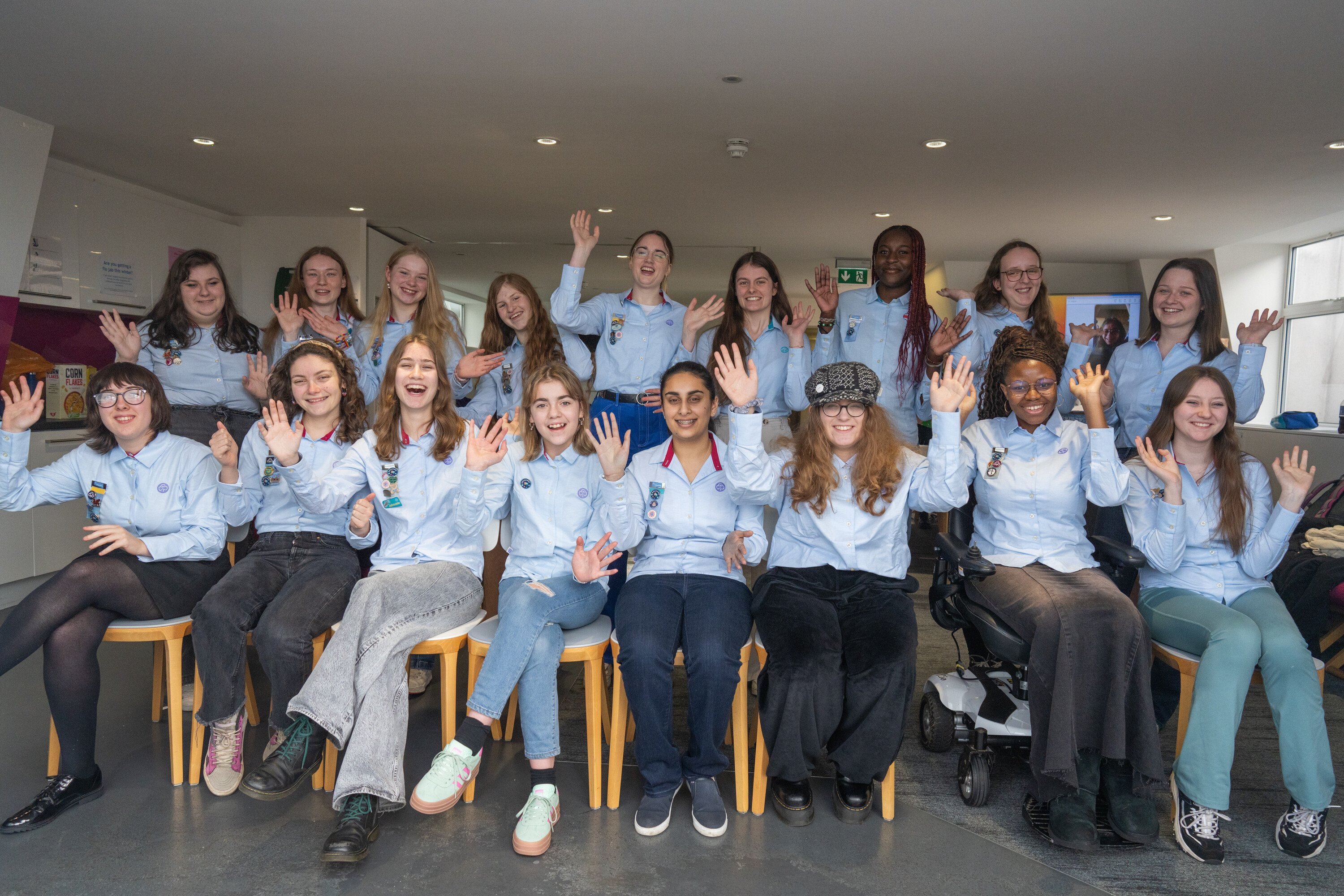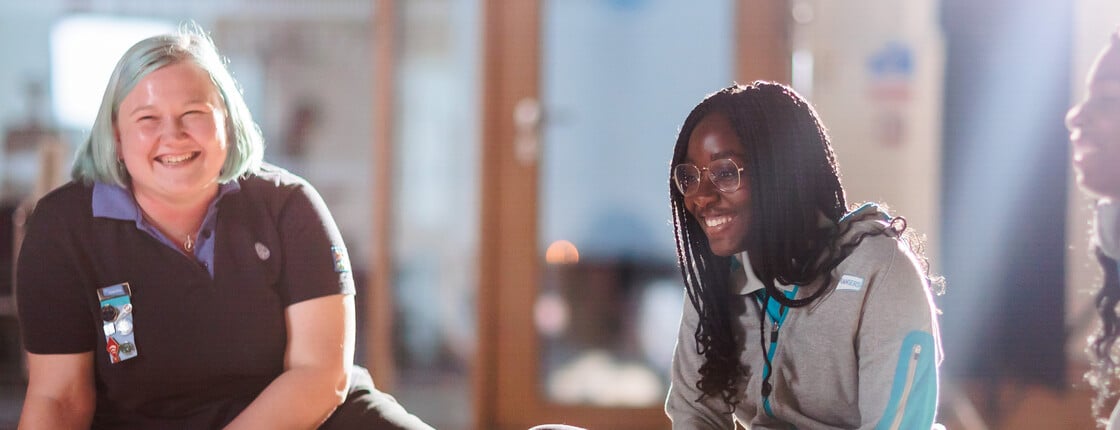Peer education
We train our young members to lead fun and interactive sessions on important topics
Peer educators are 14-25-year-olds who help Brownies, Guides and Rangers explore important topics.
Go to:
- What is peer education?
- Become a peer educator
- Information for peer educators
- Request a peer educator
- Become a peer education coordinator
What is peer education?
As young people, peer educators use their own experience to bring important subjects to life.
It works because girls are eager to listen to their peers who share similar life experiences.
Peer educators run fun, safe and challenging sessions which we develop with expert partners. They can deliver sessions on:
- Think Resilient - gives girls the tools to build their mental well-being. Developed with YoungMinds
- Breaking Free - gives girls the tools to challenge gender stereotypes. Developed with expert academics, CEOs and charities.
- Safe The World - helps members make a stand for safety. Developed with charity experts and police officers.
Become a peer educator
Who can become a peer educator?
Any member of Girlguiding aged 14-25 can complete the training and become a peer educator.
As the role is so flexible, it can be a great way to stay connected to Girlguiding whilst you’re at university or when you can’t commit to more regular volunteering.
If you’re not already involved in Girlguiding, you can sign up online to join us. We’d recommend getting involved locally first to give you an understanding of how Girlguiding works before training to become a peer educator. If you’re aged 14-17, you could become a young leader or join a Ranger unit. If you’re over 18, you could volunteer as a unit helper, and then attend a peer education training.
How do I become a peer educator?
To become a peer educator, you’ll need to attend training to help you get the skills you need. It covers:
- Running activities and games, facilitating discussions.
- Active listening, presenting, and asking useful questions.
- How to manage challenging behaviour.
- Exploring and understanding the topic of the activities.
- Making sure everyone is safe.
Peer education training is run by our local teams across the country – so keep an eye on your local country or region website for details of the next training.
As a peer educator you have an important role in protecting yourself and the girls you work with from harm and creating a safe space. So you’ll also need to complete our a safe space training. We have a special a safe space e-learning for 14-17-year-olds. Over 18’s need to complete safer guiding training. You can find these on our learning platform.
Is peer education for you?
Our introduction to peer education e-learning explains the role of a peer educator and is the first step to being trained up.
Next steps
Completed the e-learning and decided peer education is for you? Here are your next steps:
- Fill in this form with your details so the e-learning can be added to your GO record.
- Tell your unit leader or local commissioner that you’d like to be a peer educator, and they can help you find a peer education skills and topic training that you can get to. You can find details on your country or region website and social media channels, so keep an eye out and sign up!
- Attend a training and get the key knowledge and skills you need to be a peer educator.
- Deliver your first peer education sessions on one of our topics – Think Resilient, Breaking Free or Safe the World.
- Be sure to record your sessions on our session log.
- We’ll update your GO record within a month of your training with your new role.
- Congratulations – you’re now a peer educator!
To recognise your amazing work inspiring girls and young women, you can achieve special peer educator badges to mark the number of sessions you deliver.
If you need any help with these steps, or you just can’t find the information you need, email us at [email protected].
Information for peer educators
Now you're officially a peer educator, you need to get your name out there so leaders can book you for a session.
You can:
- Advertise through your county newsletter.
- Go to county days.
- Speak to local leaders.
- Ask your commissioner to send an email out for you.
Ask your coordinator to support you and help with other suggestions.
Tip - deliver your first session in a unit you're comfortable with to build up your confidence.
Once you have a session booked, you'll need to get in touch with the unit leader to plan the session and discuss the requirements of the girls and the venue.
This can be by email or video call. If you're under 18, make sure you include your coordinator, or another adult in any communication.
If you are over 18, and do not have a disclosure check for another Girlguiding role, you'll need to complete the visitor agreement form before you go to a new unit, and follow the visitors checklist.
Then go and run your session!
Afterwards, use our online form to keep us up to date with all the sessions you're running.
You can earn pin badges for running peer education sessions which are available from Girlguiding HQ.
To get your badges, download and fill out the form below and send it to your coordinator.
- Bronze pin badge form – submit after 4 sessions.
- Silver pin badge form – submit after 25 sessions.
- Gold pin badge form – submit after 50 sessions.
Your county peer education coordinator, county programme adviser and county commissioner can help you with any challenges you face locally - be that a complicated session, where to get your pin badge or how to arrange resources for your sessions.
Email your county commissioner to find out if you have a local peer education coordinator or contact [email protected] to be put in touch with them.
If a girl brings up anything you're worried about, inform the girl's unit leader and they will take forward our Safeguarding advice. You should also go to your local coordinator, county programme adviser or county commissioner to get support for yourself.
Topic trainings are 1-day trainings, developed to help you deliver sessions on a new resource. Nationally, we'll run some of these when a new resource comes out, but keep your eyes on your country/region website where they will update trainings near you.
Request a peer educator
What does a peer education session look like?
- The peer educator will come prepared to run the whole meeting, taking some of the pressure off you – although you’ll still be responsible for supporting the session.
- The peer educator will draw on their own life experiences to enable open and honest discussions.
- The session will be packed with fun activities, so your girls will have a great time as well as learn something from their peers.
- Depending on the topic, you'll have some activities to continue exploring the subject with your unit after the session.
Check out our working with young volunteers page for more tips on working with peer educators.
The fastest way to request a session is to look on your country or region website for details of your peer education coordinator.
If you get stuck, you can fill in this online form to help us find you a peer educator to deliver a session. We'll pass this information on to your country or region peer education coordinator who’ll see if there's a peer educator available in your local area and get in touch with you.
Become a peer education coordinator
As a peer education coordinator you'll:
- Link leaders and peer educators together to organise sessions.
- Support peer educators to shout about their skills and arrange sessions locally.
- Encourage Rangers to get involved with peer education.
- Coach and mentor peer educators to develop their peer education skills.
- Make sure that your peer educators get (and celebrate) their badges.
- Help set up training events for new peer educators.
You don't have to have been a peer educator to become a peer education coordinator.
Find out more about the peer education coordinator role.
Become a peer education coordinator
Go directly to your county commissioner to find out if the role has been filled in your area. For more information about the role, email our peer education team.



